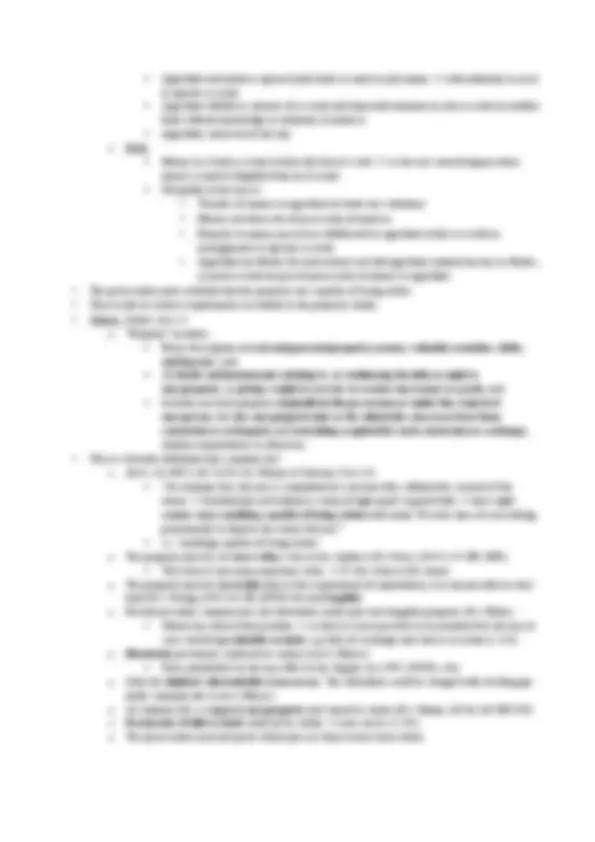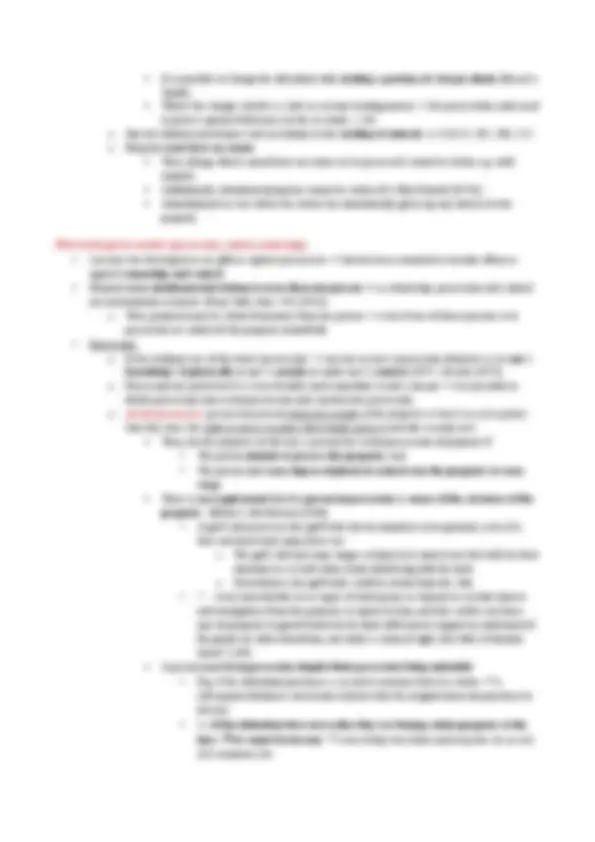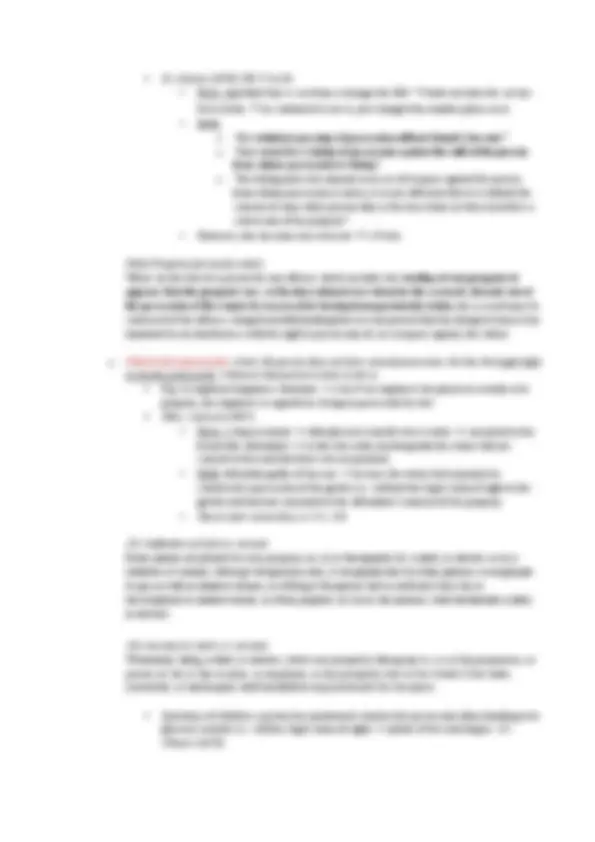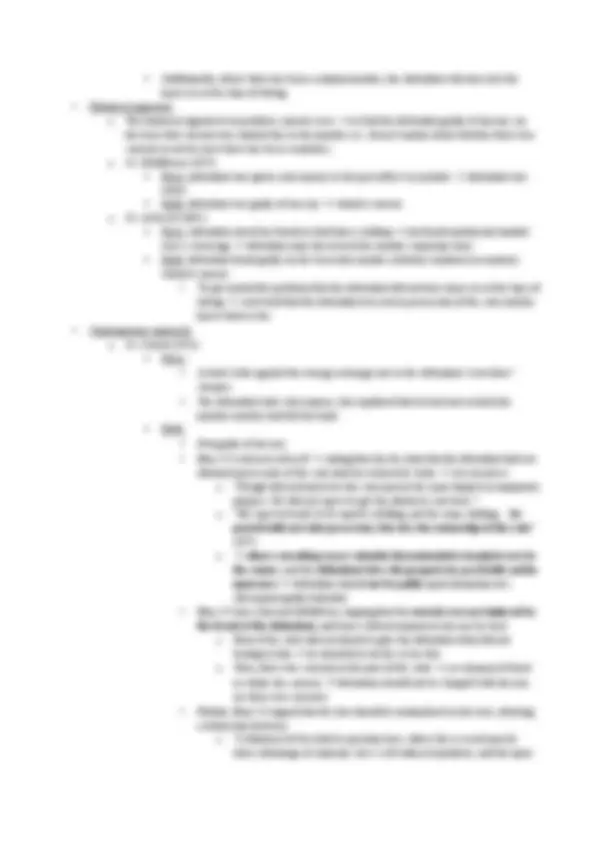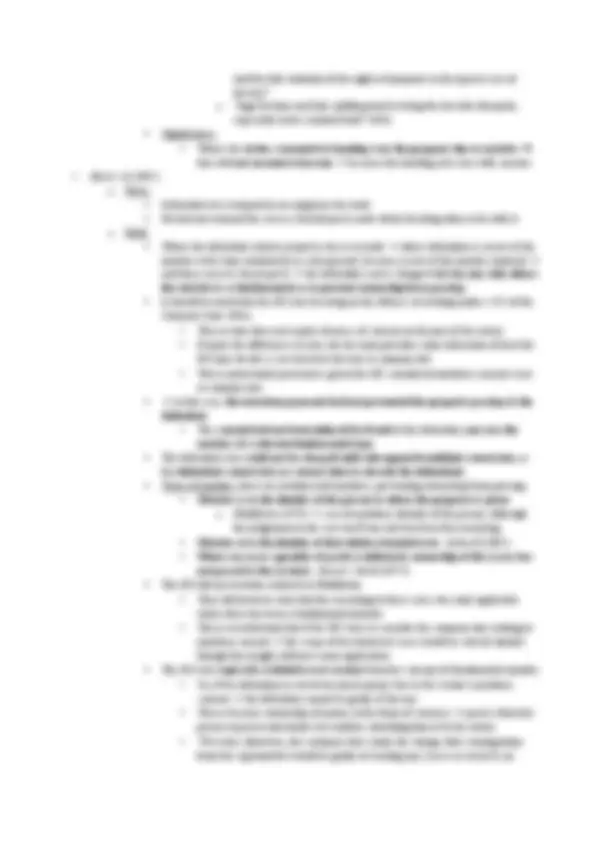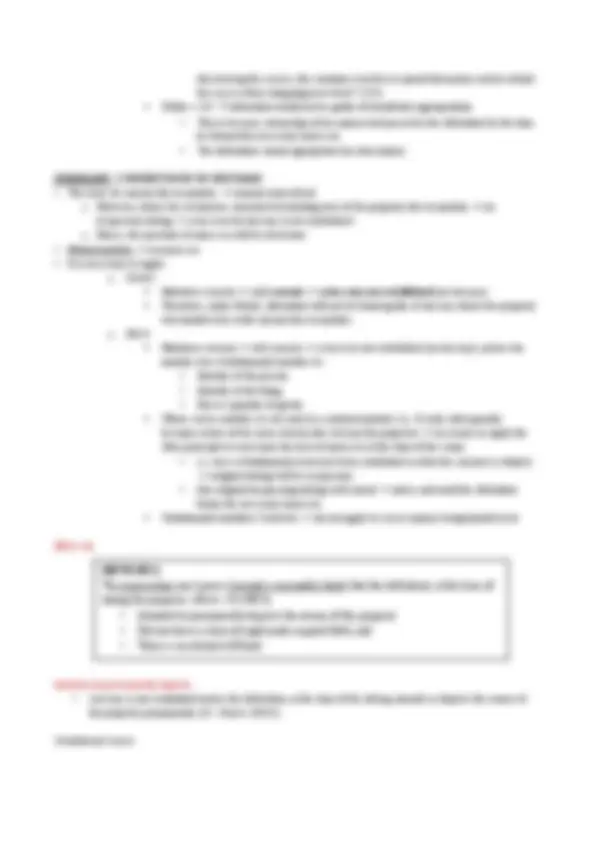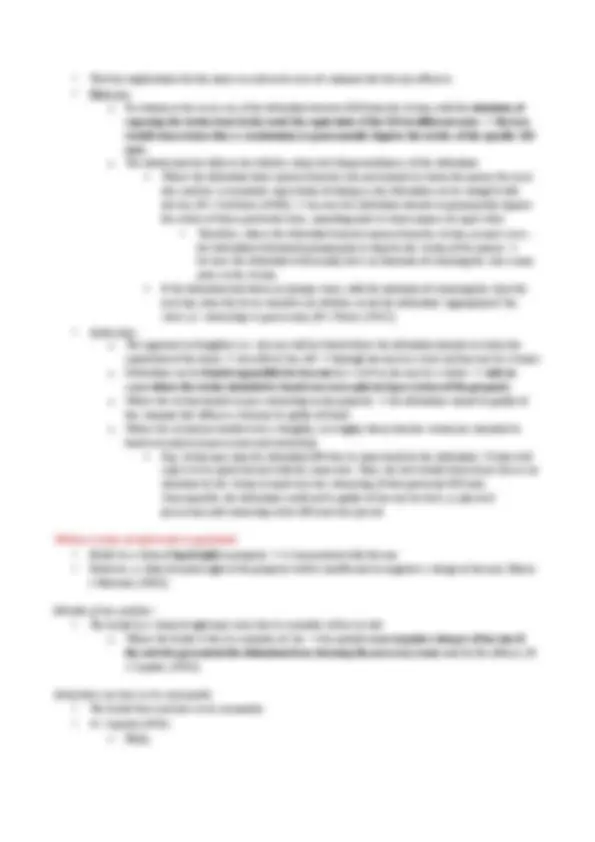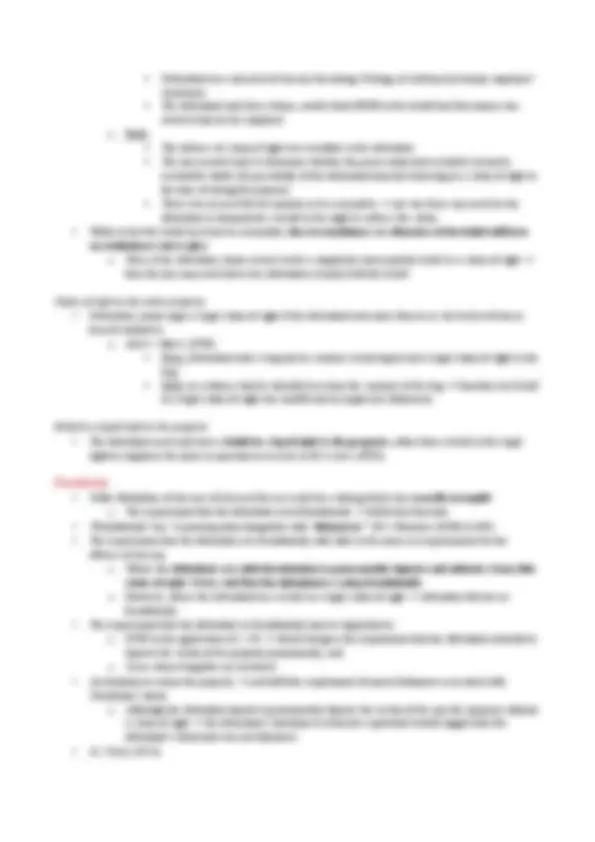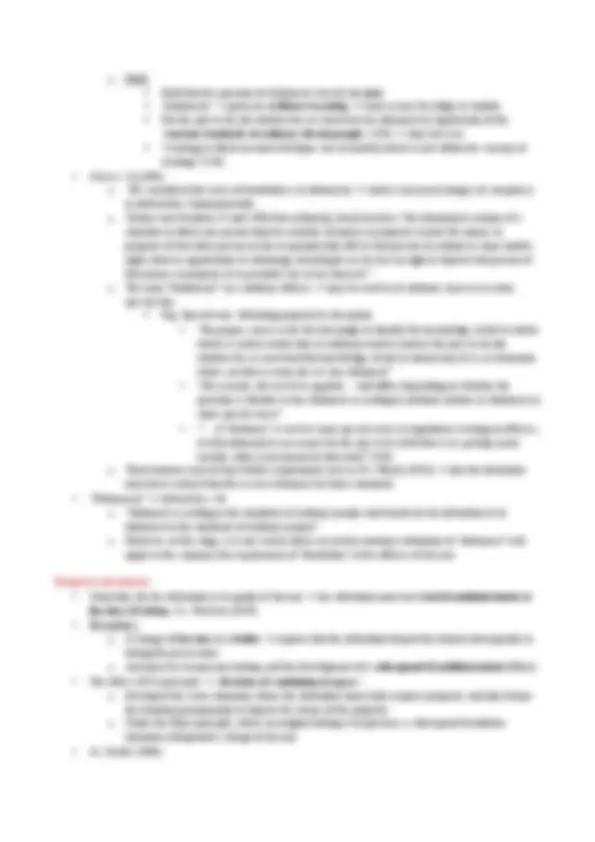Download Criminal Law & Procedure and more Slides Criminal Law in PDF only on Docsity!
Criminal Law & Procedure
Week 6:
a. Property Offences: Larceny
Introduction to common law larceny
- Larceny is the basic property offence at common law and is colloquially known as ‘theft’ or ‘stealing’
- Originally all larcenies, except the most trivial, were punishable by death o In order to limit the application of the death penalty à judges applying the law tried to confine the crime of larceny within narrow limits. o They really only wanted to capture those people who were overtly dishonest or trespass against possession i.e. the taking of property without the consent of the person in possession
- In the late 19th century the punishment for larceny became more reasonable and judges sought to widen the scope of common law larceny. o Gradually new offences emerged to cover situations that escaped the traditional application of larceny e.g. larceny by trick (1779) and 19th century embezzlement provisions.
- What we are left with in common law jurisdictions is a complex law of property offences o Common law jurisdictions such as NSW have a mixture of old laws and old rules à with new statutory provisions and new rules to overcome some of the issues with the traditional concept of larceny
- Crimes Act 1900 (NSW) s 117:
o “Whosoever commits larceny, or any indictable offence by this Act made punishable like larceny, shall, except in the cases hereinafter otherwise provided for, be liable to imprisonment for five years .” o Only stipulates the punishment à therefore need to turn to common law o Larceny therefore in NSW is a common law crime
- Ilich v R (1987) 162 CLR 110, Wilson & Dawson JJ at 123 o “At common law, larceny is committed by a person who , without the consent of the owner à fraudulently and without a claim of right made in good faith à takes and carries away anything capable of being stolen with intent at the time of such taking, permanently to deprive the owner thereof.” Burden of proof
- In order to establish the offence of larceny à the prosecution must prove all elements of the offence beyond a reasonable doubt
- Property inspesia: direct identifiable thing à contrasts fungibles Actus Reus Taking and carrying away
- The prosecution must prove that the defendant took and carried away the property
- For larceny to be committed à there must be asportation: physical removal of the property being stolen
- The slightest movement is enough to satisfy the “carrying off” requirement à but there must be some movement o R v Lapier (1784) 168 ER 263: attempting to steal an earring and moving it to the point where the earing became entangled in the owner’s hair, was held to be sufficient asportation
- Mere passive retention of the property by the defendant will not be sufficient for larceny o There must be a positive act on the part of the defendant : R v Thomas (1953) 37 Cr App R 169 Property capable of being stolen
- Croton v R (1967) o Facts:
ACTUS REUS
The prosecution must prove, beyond a reasonable doubt that the defendant:
- Took and carried away;
- Property capable of being stolen;
- Which belonged to another; and
- Without the consent of the owner
§ It is possible to charge the defendant with stealing a portion of a larger whole (Russel v Smith) § Where the charges involve a clerk or servant stealing money à the prosecution only need to prove a general deficiency in the accounts: s 161 o Special statutory provisions exist in relation to the stealing of animals : ss 126-32; 505; 506; 512 o Property must have an owner § Thus, things which cannot have an owner or be possessed cannot be stolen e.g. wild animals § Additionally, abandoned property cannot be stolen (R v MacDonald [1953]) § Abandonment occurs where the owner has intentionally given up any interest in the property Which belonged to another (possession, control, ownership)
- Larceny was developed as an offence against possession à but has been extended to include offences against ownership and control
- Property may simultaneously belong to more than one person à as ownership, possession and control are not mutually exclusive (Duyo John Anic v R [1953]) o Thus, property may be stolen from more than one person à even if one of those persons is in possession or control of the property unlawfully
- Possession: o In the ordinary use of the word ‘possession’ à one has in one’s possession whatever is, to one’s knowledge à physically in one’s custody or under one’s control ( DPP v Brooks [1974] o Possession has proved to be a very flexible (and somewhat vexed) concept à it is possible to divide possession into actual possession and constructive possession o Actual possession: person has present physical custody of the property or has it in such a place that they have the right or power to place their hands upon it and take custody of it § Thus, for the purposes of larceny, a person has actual possession of property if: - The person intends to possess the property ; and - The person had some degree of physical control over the property at some stage § There is no requirement that the person in possession is aware of the existence of the property: Hibbert v McKiernan [1948] - A golf club possesses the golf balls lost by members in its grounds, even if it does not know how many there are. o The golf club had some degree of physical control over the balls by their intention to exclude others from interfering with the land. o Nevertheless, the golf balls could be stolen from the club - “… every householder or occupier of land means or intends to exclude thieves and wrongdoers from the property occupier by him, and this confers on him a special property in goods found on his land sufficient to support an indictment if the goods are taken therefrom, not under a claim of right, but with a felonious intent” (148) § A person may be in possession despite their possession being unlawful - E.g. if the defendant purchases a car and is unaware that it is stolen à a subsequent dishonest conversion will not alter the original innocent purchase to larceny - i.e. if the defendant does not realise they are buying stolen property at the
time à^ it cannot be larceny à even if they do realise and keep the car or sell
it to someone else
§ R v Davies [1970] VR 27 at 30
- Facts: appellant buys a car from a stranger for $20 à finds out later the car has
been stolen à he continued to use it, just changed the number plates on it
- Held: o “the voluntary passing of possession will not found a larceny ” o “there must be a taking of possession against the will of the person from whom possession is taking ” o “the taking must also amount to an act of trespass against the person from whom possession is taken; it is not sufficient that it is without the consent of some other person who is the true owner or that it involves a conversion of his property”
- However, this decision was reversed à s 94AA 94AA Property previously stolen Where on the trial of a person for any offence which includes the stealing of any property it appears that the property was, at the time when it was taken by the accused, already out of the possession of the owner by reason of its having been previously stolen , the accused may be convicted of the offence charged notwithstanding that it is not proved that the taking by him or her amounted to an interference with the right to possession of, or a trespass against, the owner. o Constructive possession: where the person does not have actual possession, but has the legal right to assume possession, whenever that person wishes to do so § E.g. in employer/employee situations à even if an employee has physical custody over property, the employer is regarded as being in possession by law § Ellis v Lawson (1987)
- Facts: a shop assistant à with physical custody over a radio à consented to her friend (the defendant) à to take the radio, knowing that the owner did not consent to this and that there was no payment
- Held: defendant guilty of larceny à because the owner had remained in constructive possession of the goods (i.e. still had the legal claim of right to the goods) and had not consented to the defendant’s removal of the property
- This is now covered by ss 155; 156 155 Definition of clerk or servant Every person employed for any purpose , as, or in the capacity of, a clerk, or servant, or as a collector of moneys, although temporarily only, or employed also by other persons, or employed to pay as well as receive moneys, or although the person had no authority from his or her employer to receive money, or other property, on his or her account, shall be deemed a clerk, or servant. 1 56 Larceny by clerks or servants Whosoever, being a clerk, or servant, steals any property belonging to, or in the possession, or power of, his or her master, or employer , or any property into or for which it has been converte d, or exchanged , shall be liable to imprisonment for ten years. § Questions of whether a person has maintained constructive possession when handing over physical custody (i.e. still has legal claim of right) à matter of fact and degree: R v Chisser (1678)
§ The machine à could not give the bank’s consent § “the proper inference to be drawn from the facts is that the bank consented to the withdrawal of up to $200 by a cardholder who presented his card and supplied his personal identification number, only if the cardholder had an account that was valid. It would be quite unreal to infer that the bank consented to the withdrawal by a cardholder whose account had been closed” – at 18 § The HC has not considered what the position would be where an account existed and was current but had insufficient funds to cover the withdrawal
- R v Turvey [1946] o Facts: § The defendant planned to steal property from his employer § The defendant’s co-conspirator told the defendant’s boss, who advised the co-conspirator to go along with the plot and hand the property over to the defendant to entrap him o Held: § Defendant not guilty of larceny § “he did not carry away the goods against the will of the owner, but because the owner was willing that he should have the goods and gave them to him” (62) § à therefore, where property is delivery personally, or at the owner’ discretion, the owner cannot deny consent
- Martin v Puttick [1968] o Facts: § Defendant stole some chops at a supermarket à put them in her shopping bag § She purchased other goods and then gave the manager her bag à to help her pack her purchases § After she had gone through the checkout point à her arrested her for stealing the chops o Held: § The defendant had stolen the chops § When the defendant had handed her shopping bag over to the manager, she did not give up her constructive possession of the bag § Thus, his handing the loaded bag back to her did not amount to consent, but merely facilitation § Where facilitation occurs à no consent Threats
- Consents due to threats or intimidation may be vitiated (R v Lovell (18881)) Consent due to fraud or trickery
- Consent obtained due to fraud or trickery à covered by the defence of fraud s 192E Consent due to mistake
- Problems occur when the defendant has received property due to mistaken consent by the owner o The issue is whether or not the defendant should be criminally liable for doing no more than taking advantage of another’s mistake o Types of mistake: § Unilateral: defendant obtains the property due to mistake à defendant is aware of the mistake § Mutual: defendant obtains property due to a mistake à only subsequently becomes aware of the mistake o à in both types of mistake, the property has been handed over with consent § Consequently, a crucial aspect of the actus reus has not been established
§ Additionally, where there has been a mutual mistake, the defendant will also lack the mens rea at the time of taking
- Historical approach o The historical approach to mistaken consent cases à to find the defendant guilty of larceny, on the basis that consent was vitiated due to the mistake (i.e. doesn’t matter about whether there was consent or not because there has been a mistake) o R v Middleton (1873) § Facts: defendant was given extra money at the post office by mistake à defendant was aware § Held: defendant was guilty of larceny à vitiated consent o R v Ashwell (1885) § Facts: defendant asked his friend to lend him a shilling à his friend mistakenly handed over a sovereign à defendant only discovered the mistake sometime later § Held: defendant found guilty on the basis that mistake (whether unilateral or mutual) vitiated consent - To get around the problem that the defendant did not have mens rea at the time of taking à court held that the defendant was not in possession of the coin until he knew what it was
- Contemporary approach o R v Potisk (1973) § Facts: - A bank teller applied the wrong exchange rate to the defendant’s travellers’ cheques - The defendant took extra money, but explained that he had not realised the mistake until he had left the bank § Held: - Not guilty of larceny - Bray CJ criticised Ashwell à stating that the decision that the defendant had not obtained possession of the coin until he realised its value à was incorrect o “Keogh did not hand over the coin merely for some limited or temporary purpose. He did not expect to get the identical coin back.” o “He expected only to be repaid a shilling, not the same shilling … he parted with not only possession, but also the ownership of the coin ” (397) o à where something more valuable than intended is handed over by the owner , and the defendant takes the property in good faith and in ignorance à defendant should not be guilty upon formation of a subsequent guilty intention - Bray CJ also criticised Middleton, arguing that the mistake was not induced by the fraud of the defendant , and hence did not amount to larceny by trick o Even if the clerk did not intend to give the defendant what did not belong to him à he intended to do the act he this o Thus, there was consent on the part of the clerk à no element of fraud
to vitiate the consent à defendant should not be charged with larceny
(as there was consent)
- Further, Bray CJ argued that the law should be rationalised in this area, drawing a distinction between: o “a dishonest of the kind in question here, where the accused merely takes advantage of someone else’s self-induced mistaken, and the open
discovering the excess, the customer resolves to spend that money and to refund the excess when shopping next week” (254)
§ Under s 124 à defendant would not be guilty of fraudulent appropriation
- This is because ownership of the money had passed to the defendant by the time he formed the necessary mens rea
- The defendant cannot appropriate his own money SUMMARY: CONSENT DUE TO MISTAKE
- The issue of consent due to mistake à remains unresolved o However, where the victim has consented to handing over of the property due to mistake à no trespassory taking à actus reus for larceny is not established o Hence, the question of mens rea will be irrelevant
- Mutual mistake à no mens rea
- It is necessary to apply: o Potisk: § Mistaken consent à still consent à actus reus not established (no larceny) § Therefore, under Potisk, defendant will not be found guilty of larceny where the property was handed over with consent due to mistake o Illich: § Mistaken consent à still consent à actus reus not established (no larceny), unless the mistake was a fundamental mistake to:
- Identity of the person
- Identity of the thing
- Excess quantity of goods § Where such a mistake occurs and it is a mutual mistake (i.e. D only subsequently becomes aware of the error, but decides to keep the property) à necessary to apply the Riley principle to overcome the lack of mens rea at the time of the crime
- i.e. once a fundamental error has been established so that the consent is vitiated à original taking will be trespassory
- this original trespassing taking will extend à unless and until the defendant forms the necessary mens rea § ‘fundamental mistakes’ however à do not apply to excess money being handed over Mens rea Intention to permanently deprive
- Larceny is not committed unless the defendant, at the time of the taking, intends to deprive the owner of the property permanently ( R v Foster (1967)) Conditional return
MENS REA
The prosecution must prove, beyond a reasonable doubt that the defendant, at the time of
taking the property: ( Illich v R (1987))
- Intended to permanently deprive the owner of the property
- Did not have a claim of right made in good faith; and
- There is an element of fraud
- Difficulties arise where the defendant takes the goods of another à with the intention of returning them at a later time, subject to specific conditions
- E.g. defendant takes property on a Monday to pawn it, with the intention of redeeming and returning the property on Thursday when the defendant gets paid o Reasonable chance of return: § Historically , the defendant would be entitled to an acquittal à as the defendant had a reasonable chance of fulfilling the intention to return the property ( R v Medland (1951)) i.e. because no permanent deprivation – only temporary § However, if the defendant had taken the property with the intention of returning it when the defendant won the lottery à defendant would have the necessary mens rea at common law, as the defendant would not have a reasonable chance of winning
- S 118 has altered the common law position: 118 Intent to return property no defence Where, on the trial of a person for larceny, it appears that the accused appropriated the property in question to the accused’s own use, or for the accused’s own benefit, or that of another, but intended eventually to restore the same , or in the case of money to return an equivalent amount , such person shall not by reason only thereof be entitled to acquittal. o Exercising ownership:
§ Therefore, where the defendant takes the property à an intention to return the
property is not a defence to the charge of larceny à if the defendant has appropriated the property for their own use or benefit, or for another’s use or benefit § This is the case despite the defendant’s reasonableness to reclaim the property and return it to its owner (Foster) § Consequently, the focus is on exercising ownership, rather than the reasonableness of the intention to return
- R v Foster (1967) o Facts: § The defendant borrowed the victim’s pistol to show his parents § The victim complained to the police, and the defendant was questioned on the same day § He claimed that he had intended to return the property that same evening o Held: § The defendant’s actions did not amount to larceny under common law and under s 118 § The HC read s 118 narrowly à as dealing “with the case where an accused has appropriated the property, and not of an accused who has only assumed possession of it” (121) § The ultimate element à the intention to appropriate the goods to himself, which may either be through: - Permanent deprivation - Assuming ownership - Depriving the victim of their property in the goods § There is a distinction between “an intention to appropriate the goods as distinct from merely to assume possession of them” (i.e. ownership = larceny; possession for a period of time = not larceny) § “Thus, if the intention is to deprive the true owner of possession for a limited time, larceny is not made out. But if the intention of the taker is to exercise ownership of the goods, to deal with them as his own, an intention later to restore the property in the goods will not prevent the original taking being larcenous ” (121)
- This has implications for the mens rea and actus reus of common law larceny offences
- Mens rea: o In relation to the mens rea , if the defendant borrows $20 from the victim, with the intention of repaying the victim later in the week the equivalent of the $20 in different notes à the law would characterise this as an intention to permanently deprive the victim of the specific $ note o The distinction has little to do with the subjective blameworthiness of the defendant: § Where the defendant takes money form the till, and intends to return the money the next day, and has a reasonable expectation of doing so, the defendant can be charged with larceny (R v Cockburn [1968]) à because the defendant intends to permanently deprive the owner of those particular notes, intending only to return money of equal value - Therefore, where the defendant borrows money from the victim, in most cases, the defendant will intend permanently to deprive the victim of the money à because the defendant will usually have no intention of returning the exact same notes to the victim § If the defendant had taken an antique chair, with the intention of returning the chair the next day, then the focus would be on whether or not the defendant ‘appropriated’ the chair (i.e. ownership vs possession) (R v Foster (1967))
- Actus reus: o The approach to fungibles (i.e. larceny will be found where the defendant intends to return the equivalent of the item) à also affects the AR à through larceny by a trick and larceny by a bailee o Defendant can be found responsible for larceny by a trick or larceny by a bailee à only in cases where the victim intended to hand over mere physical possession of the property o Where the victim intends to pass ownership in the property à the defendant cannot be guilty of the common law offences, but may be guilty of fraud o Where the victim has handed over a fungible, it is highly likely that the victim has intended to hand over physical possession and ownership § E.g. victim may loan the defendant $50 due to some fraud by the defendant. Victim will expect to be rapid, but not with the same note. Thus, the law would characterise this as an intention by the victim to hand over the ownership of that particular $50 note. Consequently, the defendant could not be guilty of larceny by trick, as physical possession and ownership in the $50 note has passed Without a claim of right made in good faith
- Belief in a claim of legal right to property à is inconsistent with larceny
- However, a claim of moral right to the property will be insufficient to negative a charge of larceny (Harris v Harrison [1963]) Mistake of law and fact
- The belief in a claim of right may arise due to a mistake of fact or law o Where the belief is due to a mistake of law à the mistake may negative charges of larceny if the mistake prevented the defendant from forming the necessary mens rea for the offence (R v Lopatta (1983)) Belief does not have to be reasonable
- The belief does not have to be reasonable
- R v Lopatta (1983) o Facts:
§ Defendant was convicted of larceny for taking 20 drugs of oil from his former employer’ warehouse § The defendant took these drums, worth about $5000 in the belief that this money was owed to him by his employer o Held: § The defence of claim of right was available to the defendant § The jury needed only to determine whether the prosecution had excluded, beyond a reasonable doubt, the possibility of the defendant honestly believing in a claim of right at the time of taking the property § There was no need for the mistake to be reasonable à nor was there any need for the defendant to demonstrate a belief in the right to enforce the claim
- While at law the belief need not be reasonable, the reasonableness or otherwise of the belief will have an evidentiary role to play o Thus, if the defendant claims to have held a completely unreasonable belief in a claim of right à then the jury may not believe the defendant actually held this belief Claim of right to the entire property
- Defendant cannot argue a legal claim of right if the defendant took more than he or she believed him or herself entitled to o Astor v Hayes (1988) § Facts: Defendant took a bag and its contents, believing he had a legal claim of right to the bag § Held: no evidence that he intended to return the contents of the bag à therefore his belief in a legal claim of right was insufficient to negate his dishonesty Belief in a legal right to the property
- The defendant need only have a belief in a legal right to the property, rather than a belief in the legal right to employer the mens in question to recover it (R v Love (1989)) Fraudulently
- Older definitions of larceny all stressed the necessity for a taking which was morally wrongful o The requirement that the defendant acted fraudulently à fulfils this function
- ‘Fraudulently’ has “a meaning interchangeable with ‘ dishonesty’ ” (R v Glenister [1980] at 604)
- The requirement that the defendant acts fraudulently adds little to the mens rea requirements for the offence of larceny o Where the defendant acts with the intention to permanently deprive and without a bona fide claim of right à it is said that the defendant is acting fraudulently o However, where the defendant has a belief in a legal claim of right à defendant did not act fraudulently
- The requirement that the defendant act fraudulently may be important in: o NSW in the application of s 118 à which foregoes the requirement that the defendant intended to deprive the victim of the property permanently; and o Cases where fungibles are involved
- An intention to return the property à not fulfil the requirement of moral dishonour associated with ‘fraudulent’ intent o Although the defendant intends to permanently deprive the victim of the specific property without a claim of right à the defendant’s intention to return the equivalent would suggest that the defendant’s behaviour was not dishonest
- R v Feely [1973]
o Facts: § Defendant was driving a flock of sheep along a road when some lambs joined the flock § The defendant knew that the lambs were not his own, but drove them to his house anyway, later killing them o Held: § Defendant lacked the necessary mens rea at the time of taking the lambs à however the original taking was trespassory (Without the consent of the owner) § Thus, the subsequent formation of fraudulent intent allowed a charge of larceny to be laid
- R v Davies [1970] o Facts: § The defendant purchased a car, not realising it was stolen § When he discovered it was stolen, he decided to keep the car anyway o Held: § If the defendant’s original taking had been trespassory, that is, without the consent of the person in possession, then the Riley principle would apply à defendant would be guilty of larceny § However, as the defendant had the consent of the person in possession, he had not committed a trespass and the doctrine of continuing trespass could not apply à defendant not guilty of larceny
- Riley principle is particularly important in larceny by finding cases à i.e. where the defendant picks up property belonging to another, without any specific intent regarding the property o If the defendant later forms the necessary mens rea for larceny , the Riley principle will apply so that the defendant may be guilty of larceny, as the original taking was trespassory
- May also apply in mistaken consent cases (if Illich v R (1987) applies) o If the defendant is given property as a result of mistaken identity by the victim, this will be an original trespassory taking because the mistake as to identity was fundamental à thus vitiated consent o If the defendant later forms the intention to keep or use (under s 118) the property à the Riley principle will apply to ground a charge in larceny

